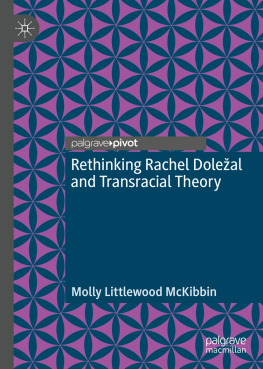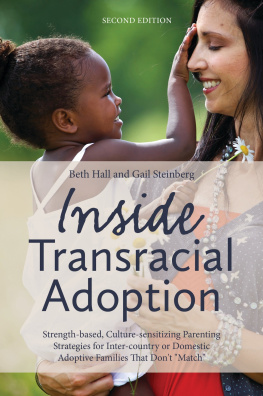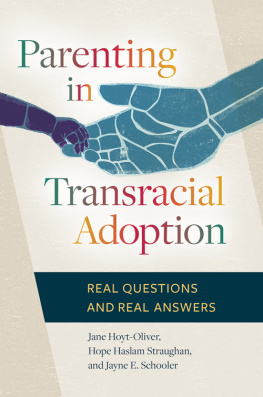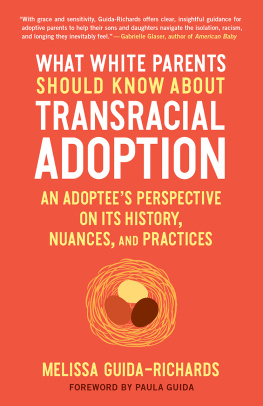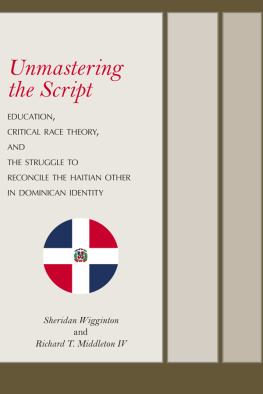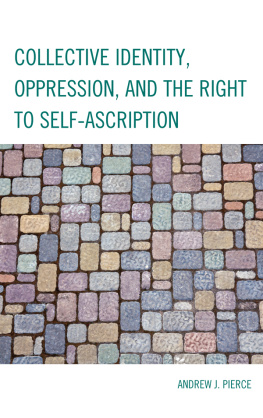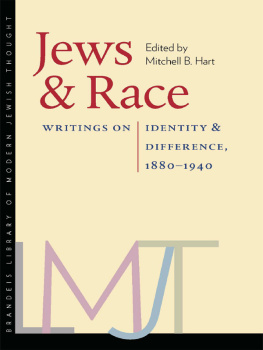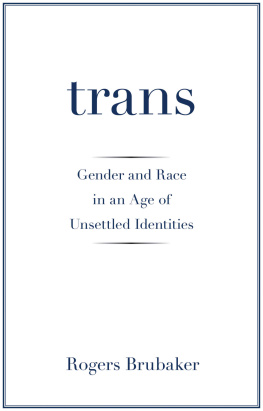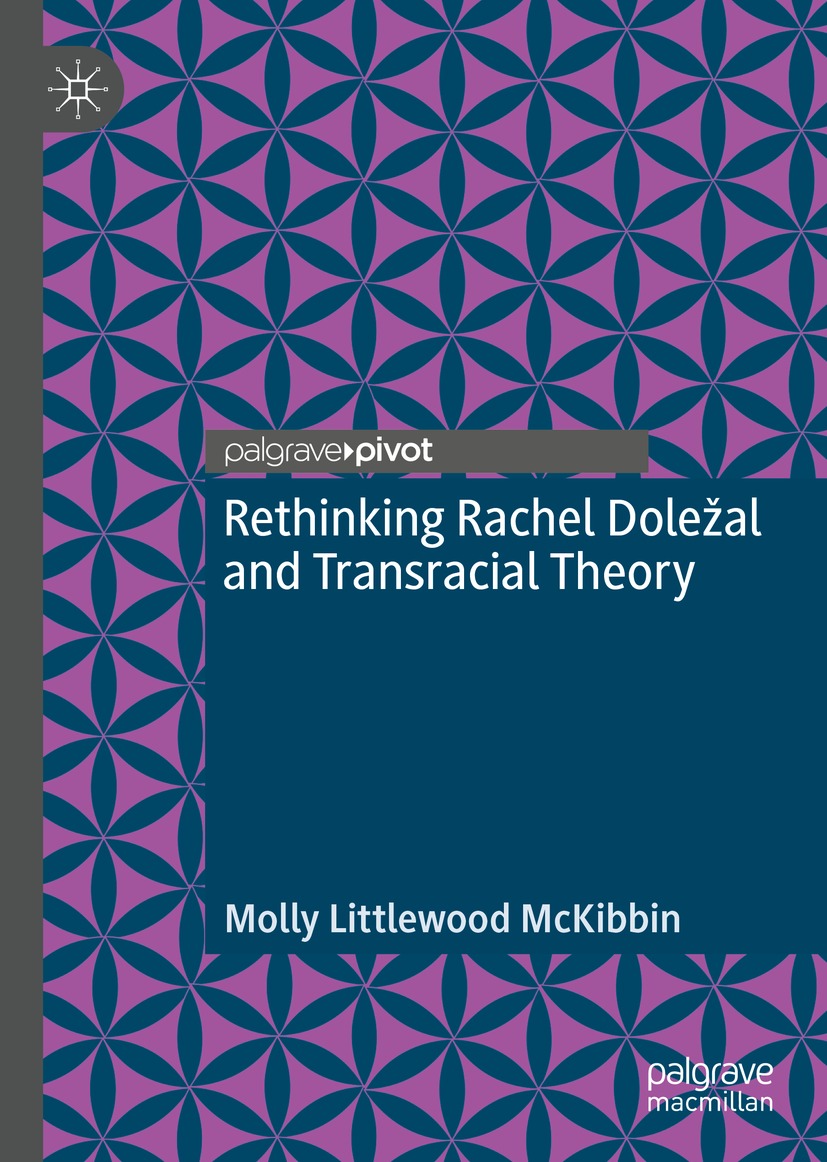Molly Littlewood McKibbin
Rethinking Rachel Doleal and Transracial Theory

Logo of the publisher
Molly Littlewood McKibbin
Kingston, ON, Canada
ISBN 978-3-030-86277-0 e-ISBN 978-3-030-86278-7
https://doi.org/10.1007/978-3-030-86278-7
The Author(s), under exclusive license to Springer Nature Switzerland AG 2021
This work is subject to copyright. All rights are solely and exclusively licensed by the Publisher, whether the whole or part of the material is concerned, specifically the rights of translation, reprinting, reuse of illustrations, recitation, broadcasting, reproduction on microfilms or in any other physical way, and transmission or information storage and retrieval, electronic adaptation, computer software, or by similar or dissimilar methodology now known or hereafter developed.
The use of general descriptive names, registered names, trademarks, service marks, etc. in this publication does not imply, even in the absence of a specific statement, that such names are exempt from the relevant protective laws and regulations and therefore free for general use.
The publisher, the authors and the editors are safe to assume that the advice and information in this book are believed to be true and accurate at the date of publication. Neither the publisher nor the authors or the editors give a warranty, expressed or implied, with respect to the material contained herein or for any errors or omissions that may have been made. The publisher remains neutral with regard to jurisdictional claims in published maps and institutional affiliations.
Cover pattern Melisa Hasan
This Palgrave Macmillan imprint is published by the registered company Springer Nature Switzerland AG
The registered company address is: Gewerbestrasse 11, 6330 Cham, Switzerland
Rethinking Rachel Doleal and Transracial Theory
In this unbridled and cogently, incisively argued meditation on transracialism through Rachel Doleal, Molly Littlewood McKibbin presents readers with the tools to begin to reimagine what is possible. Taking a deeply informed stance on the possibilities that arise when taking seriously the fissures in race and racial identity, McKibbin reckons majestically with how to approach a world in which race is of significant importance yet needs to be handled with care and complexity. And she comes correct, in the vernacular meaning of the phrase: as she thinks through this thorny issue, she shows her work, addresses key counterarguments, and does not mince words when it comes to advocating for a more complex assessment of race. This brief book is indispensable for the contemporary moment.
Marquis Bey, Assistant Professor, African American Studies and English, Northwestern University
Molly Littlewood McKibbin is a courageous thinker. She takes on a fraught topicthe possibility or not of transracial identityabout which advocates and opponents are screaming past each other, and deals with it carefully, calmly, methodically, to see what it might teach us. She wisely avoids the authenticity question, and focuses instead on the ways people are talking about the phenomenon, for and against. There is wise counsel here for those who would read and think, and a model for civil discourse.
Paul Spickard, Distinguished Professor of History, Black Studies, and Asian American Studies, University of California, Santa Barbara
The author provides us with a stimulating and provocative analysis of socially defined racial boundaries. She provides answers to why they exist, why people find them so important, and how they are still defended in the 21st century. This is an important work that deserves attention.
Joseph L. Graves Jr, author of The Emperors New Clothes (2001); The Race Myth (2005); Racism, Not Race (2021, co-author)
The history of race is simultaneously a history of Black peoples subjugation and fetishization. In Rethinking Rachael Doleal, McKibbin moves between the history of race and racism, enactments and performances of raced-identity and various claims of authenticity and its opposite to provide an account of our racial present in which race as an idea and a practice meets blackness and Black people in what is at heart an account of Black peoples ongoing struggles to narrate themselves fully to others. Race remains a site for struggle and liberation as this book so clearly demonstrates.
Rinaldo Walcott, author of The Long Emancipation: Moving toward Black Freedom
Acknowledgements
I am grateful for my family, whose love and care sustain me. I wish to thank my mother and my spouse for their constant, infinite support and their unhesitating willingness to help and to celebrate. I am profoundly fortunate to have each of them.
I am grateful for my professors, who have become mentors and friends, and whose confidence in me has mattered immeasurably to my intellectual life. I want to thank Arthur Redding at York University and Karen Bamford at Mount Allison University for their enduring support and reliable advice. I owe Art a special debt of gratitude for so generously reading an early draft of this manuscript and encouraging me to pursue publication. Many thanks as well to Leslie Sanders, also at York, for always being there when I need her.
I am grateful for my friends, especially Madhurima Chakraborty, who wisely suggested Palgrave Pivot as a home for this project and who offered extraordinary and compassionate understanding when I most needed it. I also wish to thank Amanda Paxton for her trustworthy friendship and support, Jennie Fauls for being my steadfast pandemic pen pal, and Angela Facundo and Navneet Alang for patiently answering my questions.
At Palgrave Macmillan, I would like to thank my anonymous peer reviewers who have offered helpful feedback and professionalism regarding a subject that so readily evokes uncharitable disagreement. I appreciate their willingness to engage so productively and am grateful for their generosity with their time and expertise. I also want to thank my editor, Camille Davies, for her remarkable kindness and skill.
Contents

